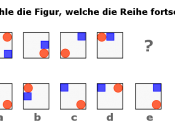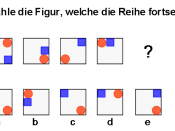Individual Project Page 2
Charles Spearman proposed his theory as justification for the current conception of
intelligence as a single entity that could be scientifically represented by a global measure. He
noticed that diverse measures of performance tend to be highly correlated, thus, performance
appeared to be dictated by one general characteristic, with the presence of task specific factors to
explain less than absolute correlations between tests(Rogers,318-20). Consequently, Spearman's
Two-Factor theory described intellectual performance as a combination of general intelligence
(g) which is present in differing degrees in all individuals, and those specific factors (s) which
vary in their strength and influence upon intellectual tasks(Fancher,92-3); yet he clearly stated
that g was merely a magnitude and not a representation of concrete reality(Edwards,108).
Moreover, the universal nature of g was applicable only to human cognitions and ability, and not
to the influences of affect and motivation as later researchers would postulate(Edwards,110).
Spearman also characterized general intelligence as mental energy, a theoretical paradigm
whereby s represents neural networks as mental engines that enable the expression of g as
energy(Edwards,110), a system in which continual competition for mental resources is indicated
by the continuity of psychological functioning(Rogers,320).
Hierarchical ordering of a matrix of the intercorrelations between various test scores was
considered to be proof for the existence of general intelligence, in that it could be arranged in
descending order according to the saturation of g in the test, which varies as a function of the
task involved(see Rogers,320). Spearman postulated the theorum of the indifference of the
indicator which states that any measure of human performance is an appropriate estimate of
Intelligence if both s and g have been well established(Rogers,322); in this manner, all aspects of
Intellectual performance could serve as a measure of g, which virtually eliminated the debate as
Individual Project Page 3
to what tasks a test should properly incorporate. Let's say that you view intelligence not as a
single overall ability, but as a collection of abilities. It follows, then, that any single number on
an intelligence test will provide, at best, an inadequate account of a persons ability (Sternberg,
Grigorenko, & Bundy, 2001).
That is an overview of the Spearman Model, now lets take a look at Gardner's Multiple
Intelligences. Howard Gardner suggests that there is more to intelligence than scores on current
intelligence tests. People can manifest intelligence in many ways that are not tapped by such
tests. ( Stephen F. Davis & Joseph J. Palladino). Lets focus on the seven kinds of intelligence
according to Howard Gardner, the first is logical-mathematical, which is used in solving
mathematics and in logical thinking. It is the ability to handle long chains of reasoning. The
second is linguistic, which is sensitivity of the sounds, rhythms, and meanings of words. The
third is musical, which the ability to produce and appreciate rhythm and pitch, also very high
level of competence. The Fourth is spatial, which is the ability to grasp how objects orient in
space, which can be very useful in art and navigation. The Fifth is bodily kinesthetic, which is
the ability to control one's body movements and to handle objects skillfully. The sixth is
interpersonal, which is sensitivity to people and an ability to understand what motivates them.
The seventh is intrapersonal, which is understanding one's emotions and being able to draw on
them to guide one's behavior. (www.admin.vmi.edu).
Although Gardner's perspectives seem to be alternatives to traditional views of
intelligence, they are in many ways complimentary in their emphasis on different aspects of
intelligence.
Individual Project Page 4
The study of intelligence has historically been dominated by the psychometric view,
according to Spearman, this view was perpetuated through increasingly sophisticated methods of
measuring and analyzing data of intelligence. Gardner's views became disenchanted with the
traditional, psychometric theories of intelligence. One major issue which seemed to remain
elusive to these scientists, was that of differential success at activities valued by our culture. For
example, how is it that an individual's score on a traditional intelligence test could be blandly
average, yet that same individual could excel in artistic expression or in the kinesthetic
interpretation. (www.admin.vmi.edu).


